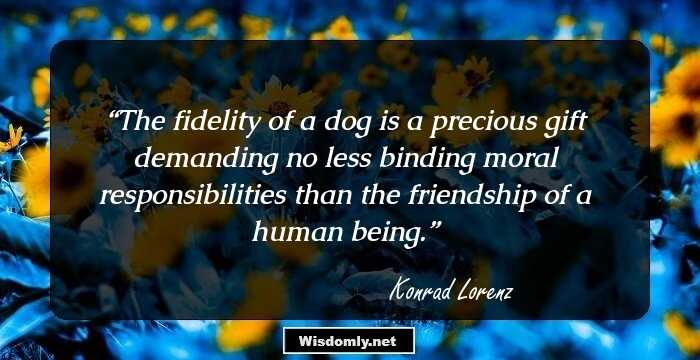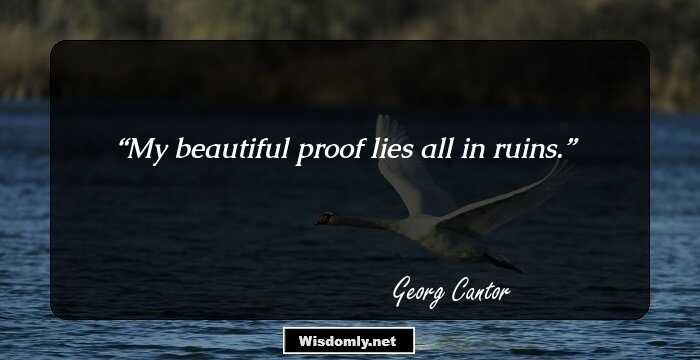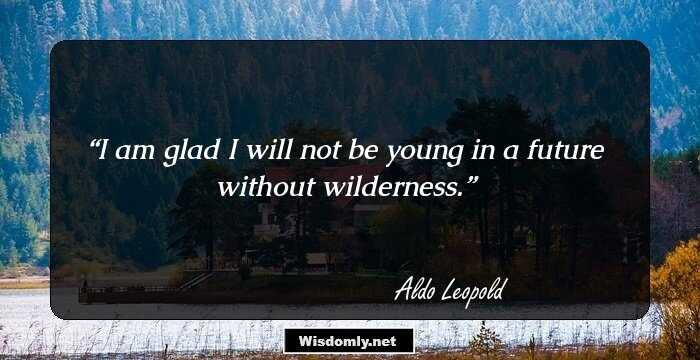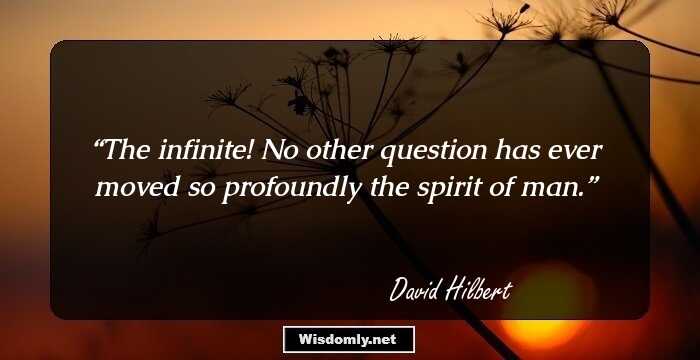32 Famous Quotes By Konrad Lorenz That You Should Bookmark
Konrad Zacharias Lorenz was an Austrian ornithologist, zoologist and ethologist, best-known for being the pioneer of ethology in the modern era. He shared the ‘Nobel Prize for Physiology or Medicine’ in 1973 for his efforts. Lorenz is one of the most important figures in the history of ethology and is particularly noted for refining the study on behaviour of animals. Ethology became another branch of biology due to Lorenz’s untiring efforts in collaboration with other scientists. Lorenz had also served in the German army during the ‘Second World War’ but later showed profound remorse for having served the Nazis during the war. Lorenz was also a prolific writer and some of his noted works include ‘On Aggression’, ‘Man Meets Dog’ and ‘King Solomon’s Ring’. Another book ‘Here I Am- Where Are You?’ is an account of the work that he had done throughout his life. Here is a collection of some of his most well-known quotes from his work and life. Let’s take a look at what we can learn from some of the most famous quotes and thoughts by Konrad Lorenz.

The fidelity of a dog is a precious gift demanding no less binding moral responsibilities than the friendship of a human being.

There is no faith which has never yet been broken, except that of a truly faithful dog

Philosophers are people who know less and less about more and more, until they know nothing about everything. Scientists are people who know more and more about less and less, until they know everything about nothing.

The fidelity of a dog is a precious gift.

The bond with a dog is as lasting as the ties of this Earth can ever be.

The truth about an animal is far more exciting and altogether more beautiful than all the myths woven about it.
Most people have forgotten how to live with living creatures, with living systems and that, in turn, is the reason why man, whenever he comes into contact with nature, threatens to kill the natural system in which and from which he live.

Just thinking that my dog loves me more than I love him, I feel shame.
The competition between human beings destroys with cold and diabolic brutality... Under the pressure of this competitive fury we have not only forgotten what is useful to humanity as a whole, but even that which is good and advantageous to the individual. [...] One asks, which is more damaging to modern humanity: the thirst for money or consuming haste... in either case, fear plays a very important role: the fear of being overtaken by one's competitors, the fear of becoming poor, the fear of making wrong decisions or the fear of not being up to snuff...

In science, new ideas are at first completely neglected, later fiercely attacked, and finally regarded as well known.

Humor and knowledge are the two great hopes of our culture.
All living beings have received their weapons through the same process of evolution that moulded their impulses and inhibitions; for the structural plan of the body and the system of behaviour of a species are parts of the same whole.... Wordsworth is right: there is only one being in possession of weapons which do not grow on his body and of whose working plan, therefore, the instincts of his species know nothing and in the usage of which he has no correspondingly adequate inhibition.

A man sufficiently gifted with humor is in small danger of succumbing to flattering delusions about himself, because he cannot help perceiving what a pompous ass he would become if he did.
All the advantages that man has gained from his ever-deepening understanding of the natural world that surrounds him, his technological, chemical and medical progress, all of which should seem to alleviate human suffering... tends instead to favor humanity's destruction.

It is a good morning exercise for a research scientist to discard a pet hypothesis every day before breakfast. It keeps him young.

Barking dogs occasionally bite, but laughing men hardly ever shoot.
...he who has seen the intimate beauty of nature cannot tear himself away from it again. He must become either a poet or a naturalist and, if his eyes are keen and his powers of observation sharp enough, he may well become both.

It ought to be realized by all dog owners that obesity shortens a dog's life quite considerably, a life which is much too short anyhow.

Truth in science can be defined as the working hypothesis best suited to open the way to the next better one.
The appeal of the cat lies in the very fact that she has formed no close bond with [man], that she has the uncompromising independence of a tiger or a leopard while she is hunting in his stables and barns: that she still remains mysterious and remote when she is rubbing herself gently against the legs of her mistress or purring contentedly in front of the fire.

The human soul is very much older than the human mind.

The instinctive need to be the member of a closely knit group fighting for common ideals may grow so strong that it becomes inessential what these ideals are.

The missing link between animals and the real human being is most likely ourselves.

I have found the missing link between the higher ape and civilized man: It is we.
The rushed existence into which industrialized, commercialized man has precipitated himself is actually a good example of an inexpedient development caused entirely by competition between members of the same species. Human beings of today are attacked by so-called manager diseases, high blood pressure, renal atrophy, gastric ulcers, and torturing neuroses: they succumb to barbarism because they have no more time for cultural interests.

The human mind, in taking us down the path of technocracy, has become the adversary of life itself and collaterally the adversary of the human soul.
I am convinced that of all the people on the two sides of the great curtain, the space pilots are the least likely to hate each other. Like the late Erich von Holst, I believe that the tremendous and otherwise not quite explicable public interest in space flight arises from the subconscious realization that it helps to preserve peace. May it continue to do so!

Every scientist should, after all, regard it as his duty to tell the public, in a generally intelligible way, about what he is doing

Every danger loses some of its terror once its causes are understood.

Scientific truth is universal, because it is only discovered by the human brain and not made by it, as art is.










